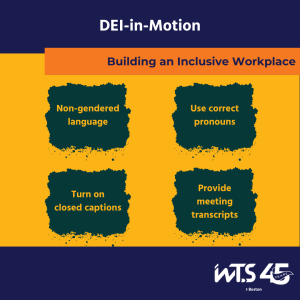WTS-Boston DEI in Motion: Building an Inclusive and Accessible Workplace
Building an Inclusive and Accessible Workplace
The transportation industry serves as the backbone of economic activity, connecting communities and enabling commerce across the globe. As this vital sector continues to evolve, creating inclusive and accessible workplaces has become not just a moral imperative but a business necessity. Organizations that prioritize inclusion and accessibility benefit from diverse perspectives, improved innovation, and access to a broader talent pool—all critical advantages in an industry facing significant workforce challenges.

The Foundation: Inclusive Language in Transportation
Inclusive language forms the cornerstone of creating welcoming workplaces where every employee feels valued and respected. In the transportation industry, this means being intentional about how we communicate, ensuring that all team members have equal opportunities to contribute and advance.
The importance of inclusive language extends beyond simple courtesy. When employees feel genuinely accepted through respectful communication, they are more likely to engage fully in their work, share innovative ideas, and remain with their organizations long-term [1]. This creates a level playing field where success is determined by skill, dedication, and performance rather than by whether someone feels they belong.
Practical Applications of Inclusive Language
Implementing inclusive language in workplaces requires attention to several key areas. First, using correct pronouns demonstrates respect for individual identity and creates an environment where everyone feels acknowledged. This simple practice can significantly impact workplace culture, particularly in traditionally male-dominated transportation sectors. Research from the Linguistic Society of America defines inclusive language as language that "acknowledges diversity, conveys respect to all people, is sensitive to differences and promotes equal opportunities" [2].
The transportation industry offers numerous examples where inclusive language can make a difference. Consider replacing "manpower" with "workforce," "chairman" with "chairperson" or "chair," and "guys" when addressing mixed groups with "team," "everyone," or "colleagues." These changes may seem small, but they collectively create an environment where all employees feel they have equal potential to succeed.
The Business Case for Inclusion
Beyond creating a positive workplace culture, inclusive language serves important business functions in transportation organizations. Research from Harvard Business Review found that "organizations with inclusive cultures are twice as likely to meet or exceed financial targets and six times more likely to be innovative and agile" [3]. Similarly, McKinsey research shows that diverse companies are 25% more profitable than non-diverse businesses, highlighting the direct financial benefits of inclusive practices [4].
However, the transportation industry faces particular challenges in this area. According to the Kantar Inclusion Index, "less than half of transportation employees believe that their organizations are actively pursuing inclusion" [5]. The sector also reports above-average workplace bullying and harassment, with employees frequently experiencing situations where they were made uncomfortable. These findings underscore the urgent need for comprehensive inclusion and accessibility initiatives in transportation workplaces [6].
Beyond Words: Creating Accessible Work Environments
While inclusive language provides the foundation, truly inclusive workplaces go further by ensuring all materials and communications are accessible to employees with different abilities and needs. This comprehensive approach to accessibility demonstrates genuine commitment to inclusion and ensures that every team member can contribute effectively.
The Path Forward
Creating truly inclusive and accessible workplaces requires ongoing commitment and continuous learning. As the industry evolves and workforce demographics continue to diversify, organizations that prioritize these values will be best positioned to attract top talent, foster innovation, and maintain competitive advantages.
The transportation industry's future depends on its ability to harness the full potential of its workforce. By embracing inclusive language and comprehensive accessibility practices, organizations can create environments where every employee has the opportunity to contribute meaningfully to moving people and goods safely and efficiently across our interconnected world.
Success in this endeavor requires recognizing that inclusion and accessibility are not destinations but ongoing journeys. Organizations that commit to this path will find themselves better equipped to navigate the challenges and opportunities that lie ahead in the dynamic transportation landscape.
References
1. Forbes. “Inclusion in the Workplace and 6 Reasons Why It Matters.” Available at https://www.forbes.com/councils/forbeshumanresourcescouncil/2024/02/13/inclusion-in-the-workplace-and-6-reasons-why-it-matters/, December 2024.
2. Linguistic Society of America. "Guidelines for Inclusive Language." Available at: https://www.linguisticsociety.org/resource/guidelines-inclusive-language
3. Harvard Business Review and Kantar Inclusion Index research, as cited in "The Latest Research and Innovations in Disability Inclusion and Accessibility," Changing Paces, November 2024.
4. McKinsey & Company. "Diverse companies are 25% more profitable than nondiverse businesses," as cited in Indeed Career Guide, January 2025.
5. McKinsey & Company. "Fostering inclusive & accessible transport systems," February 2022.
6. Kantar Inclusion Index findings on transportation sector inclusion challenges, as reported by McKinsey, February 2022.
Explore WTS-Boston's other pages here: WTS-Boston Homepage | News | Events